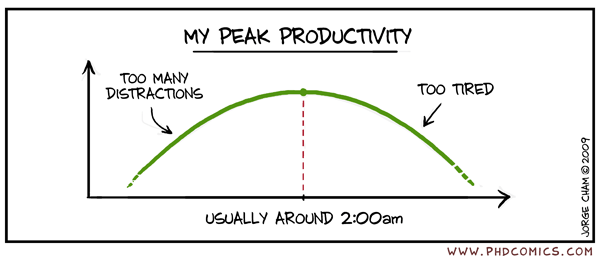Am I doing the right experiments? Am I asking the right questions? Have I published enough? Which conference can I go to next? What should I present at journal club? The questions keep coming and the answers keep drifting away. I understand and I have been in your shoes.
First of all congratulations on signing up for this journey, it is not for the faint-hearted! Maybe you are just getting started or finished with qualifiers or proposed a thesis topic; at every point of the Ph.D., you are faced with difficult questions and doubts. I hope these tips give you some clarity on how to make the best use of your time in the Ph.D. program. These pointers are in no way universal but are purely a reflection of my experience.
- Decide a research topic: You might be in a lab where everyone works on a similar topic or you might have to come up with a whole new topic and proposal. Either way, it’s imperative that you decide what you want to do. The situation varies from lab to lab but a straightforward vision or goal will help you spend quality time on your research. This will also help you plan better experiments and be prepared for any surprises, in case experiments don’t go as planned.
- Expedite your research time: Time is the most important factor in a doctoral program. Once you have a plan, you will want to investigate how to approach your research. This is where using JoVE video articles will be extremely useful. The peer-reviewed video-articles can save your precious research time by helping you with struggles when you optimize and duplicate (replicate) methods. Saving research time and grant funds, that would otherwise be spent on multiple trials of method development and optimization, will definitely make your PI happy too.
- Communicate with the community: While you may have all the arms and ammunition to conquer this battle ahead, having a chat with fellow researchers goes a long way. Don’t limit your chats to just research; learning about how other scientists plan their time (both in and out of the lab) may help you generate useful ideas for yourself. Going to conferences or academic meetups will broaden horizons and force you to think outside the box. Be engaged in student-led forums. They help you channel your thoughts and approach research questions differently. This will also help you learn useful skills for presentations and networking. In the long run, engaging with the research community will benefit both you and your research.
- Stay positive: Yes! It’s true. No matter how much you follow steps 1 - 3, you will come to a point where you feel like you are back to square one. Stay positive and remember that the difficulties help shape you into a better scientist. While having the technical know-how is important, it is equally important to have the right attitude. It’s important to stay positive and have the spirit to persevere in this endeavor. It’s important to keep moving forward and not spend too much time worrying about experiments that did not work. This is a good work ethic to have in any situation.
- Reward yourself : I wish someone had told me this a long time ago! As focused as we are on completing the Ph.D., publishing papers and attending conferences; it’s equally important to have some time to yourself and commend yourself for coming this far. Celebrate all your milestones such as: becoming a Ph.D. candidate, presenting at a journal club or even just working out an experiment after struggling with it. Rejoice in all your accomplishments (major or minor) and unwind with your colleagues.
As intense as it sounds, the journey to getting a Ph.D. can be fun, adventurous and inspiring. For me, it was a humbling experience. My Ph.D. journey made me aware that I was just the tiny part of a vast universe and there was much that I did not know and could learn.


